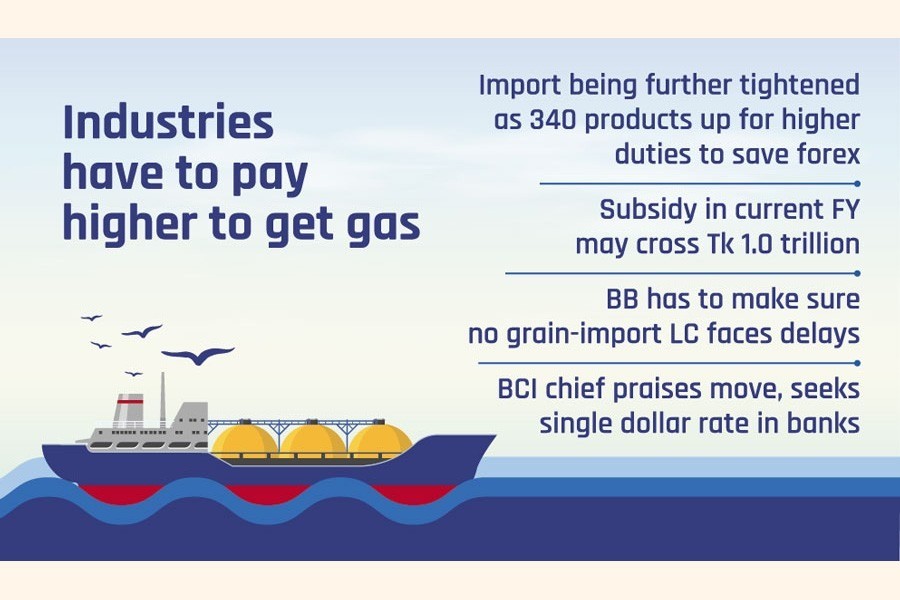In the wake of irregular and inadequate supply of the primary energy to domestic mills and factories, Bangladesh's business bodies have urged the government to import gas from the overheated global market and that they are ready to pay higher for the fuel for the sake of keeping the wheel of production rolling.
Prime Minister Sheikh Hasina in a meeting Sunday with the secretaries of different ministries at her residence at Ganabhaban gave the direction while reviewing the country's overall economic situation and the related issues, they added.
Also, the secretaries concerned have been asked to further tighten import of unnecessary items to lower spending of the foreign currency as the forex reserves are gradually going down for outgoings far outstripping the external incomes.
The ministry of commerce in the meeting said it had forwarded a list of 340 products to the National Board of Revenue (NBR) to impose higher duty to limit their import which can help lower the forex spending.
Sources at the revenue board say the NBR has been asked to check the list and put additional duties on the products deemed less important in the current contexts of local and global economic ill time.
The matter of higher subsidies on food, fertiliser, energy and power also came up for discussion and the authorities were learnt to have been asked to find how to hold the rise in check.
Recently, a government minister said subsidy for food sector this year already crossed Tk 420 billion against an allocation of Tk 280 billion.
In the current fiscal budget the government has kept a total of Tk 820 billion as subsidy for food, fertiliser, energy and power. For the Trading Corporation of Bangladesh, an official says, subsidy in the current fiscal year may cross Tk 52.80 billion in a climb from Tk 12 billion in the last fiscal year.
With significant hikes in dollar, energy, and food prices, the total subsidy in the current fiscal year may cross Tk 1.0 trillion, the meeting was told.
However, the prime minister has asked not to lower subsidy on food and fertiliser and to ensure that import of food-grains is not hindered by any means, said Food Secretary Ismiel Hossain.
Also, Bangladesh Bank Governor Abdur Rouf Talukder has been asked to ensure that "no letters of credit for food-grain import face any obstacle in order that the market does not see any shortage".
According to meeting participants LC opening for importing food-grain import in private sector had been facing problem during the last couple of weeks for shortage of required foreign currency.
At the meeting, the central bank governor was quoted as saying that the dollar shortage "may come down to a stable level by January next and then price may go down significantly".
However, the meeting discussed that different prices of US dollar in different stages were creating problems in export-import trade.
Presently, the exchange rate of the US dollar for import by exporters is Tk 99.5, Tk 105 for importers, Tk 107 for remittance collection, and interbank dollar-exchange rate is between Tk 102.44 and Tk 105.40.
Source said the prime minister asked the governor to lower the number of exchange rates of the dollar instead of keeping four rates.
She also asked the officials for taking steps to increase remittance collection. Remittance inflow through illegal channels also came up for discussion in the meeting, officials said.
Sources say recently the businesses on different occasions proposed to pay higher, if necessary, to get uninterrupted gas supply to keep the wheels of production rolling, as they claim they are hardly getting required gas and electricity.
At the meeting the prime minister, source said, asked the officials concerned to resume import of liquefied natural gas (LNG) for industrial supply but asked them to check how much the price can be increased for them.
President of Bangladesh Chamber of Industries (BCI) Anwar-ul-Alam Chowdhury (Parvez) praises the government move for resumption of LNG import responding to the businesses' call.
"We want to pay an affordable higher price and, at the same time, seek uninterrupted gas supply," he says.
Bangladesh Textile Mills Association has already offered an additional Tk 6.0 per unit of gas.
Because, he says, local businesses have to remain competitive on the international market. "We can't raise prices of products there at our will."
On reduction in the number of exchange rates, Mr Parvez feels that there should be only one dollar price in banks instead of many.
He advocated for providing the banks the liberty to collect remittance. If need be, they can pay additionally from their own. Thus the banks themselves will take steps to collect higher volume of dollar from abroad.


